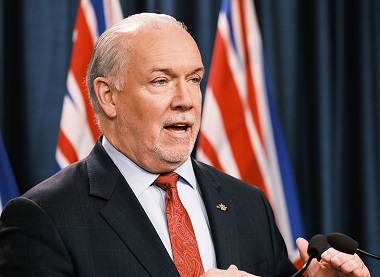
Premier John Horgan said he thanked faith leaders “from the bottom of my heart” during a December 14 conference call. BC government photo
Premier John Horgan, Provincial Health Officer Dr. Bonnie Henry and Health Minister Adrian Dix joined more than 200 faith leaders from around the province in a conference call Monday morning – and outlined a plan to engage more closely with many of those leaders.
Dix had tweeted about the initiative December 7:
Further to the work that Prem @jjhorgan, Dr. Henry, & I have done w/faith communities, we have retained Robert Daum, a well-known + respected facilitator to conduct a series of discussions w/faith leaders. We look forward to people from all denominations to take part in this effort.
He introduced the topic early on during the conference call. It was the key feature of the provincial leaders’ initial comments, and Daum spoke briefly as well.
Conference call
There have been seven conference calls with faith leaders since the beginning of the pandemic in March, and all have involved a considerable degree of mutual admiration between the provincial and faith leaders.
Horgan set the tone this time by stating, “I want to thank you all from the bottom of my heart” for all the work done and sacrifices made by congregations and other religious gatherings. He said he wants to be sure faith leaders are kept up to date about the province’s efforts to contain the spread of the virus so they can continue their work in keeping people safe.
Several faith leaders had the opportunity to ask questions and make comments. Responses were invariably respectful and broadly supportive of the province’s leadership, though some were probing and even challenging.
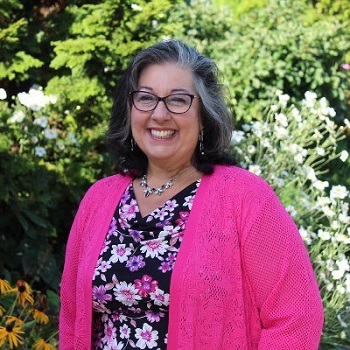
Gwen Dreger, who created a petition to re-open churches, was first to ask question during the conference call.
First to ask a question was Gwen Dreger, senior pastor of Celebration Life Ministries in Surrey and Regional Secretary for BC South of the Independent Assemblies of God – and creator of a petition to ‘re-open religious services in BC.’
She said it is particularly tough on families when pastors are not able to accompany them to administer last rites to family members and asked whether there would be some relief for that.
One rabbi from an Orthodox synagogue said they can’t use electronic devices on the sabbath because of their beliefs, so Zoom and other such approaches don’t work for them: “We are willing to go as far as possible to alleviate dangers.”
Daniel Park of Vancouver Korean Gospel Church said guidelines from the government are sometimes unclear – and they need clarity because they run five services at the same time.
Rob Thiessen, Conference Minister of the BC Conference of Mennonite Brethren Churches, said his churches have been conscientious in following the rules and are not seeing the spread of COVID. The denomination is very supportive of the provincial government, he said, “but it feels like this blanket approach is costing people,” particularly referring to issues such as mental health.
Some specifics
Erin Knott of the Canadian Pacific District of the Christian & Missionary Alliance took good notes from the conference call:
-
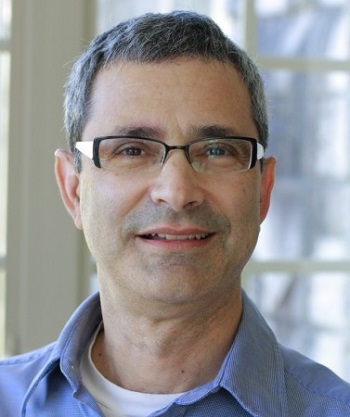
Dr. Robert A. Daum is Fellow and Lead in Diversity & Innovation at SFU’s Morris J. Wosk Centre for Dialogue.
Premier John Horgan has brought in Dr. Robert Daum from the Simon Fraser University Centre for Dialogue. He will be facilitating five 90-minute conversations with approximately 12 spiritual communities. There will be 25 – 30 people invited to a candid discussion on gathering safely over winter, with one such dialogue coming later this week. Of these dialogue groups, one will be specifically comprised of Christians to discuss gathering in the Christmas context, and other groups will be mixed and will involve Indigenous elders.
- It was reiterated several times that the government is working to hear from faith leaders, values their input and advice, and that communication and dialogue will continue throughout the pandemic.
- Dr. Bonnie Henry has validated our district response to churches for recording worship services – the number of people recording or livestreaming services should be minimized, a COVID-19 safety plan must be in place and wearing masks is required other than while singing or preaching. Dr. Henry reminded those present that singing is a higher risk and singers should be physically distanced and singing away from each other. All other videographers/techs must wear masks.
- Orders in place for gathering restrictions will be not changing at this point as community transmission is too high. There were multiple mentions that the coming months will require continued vigilance and restrictions of some sort will be in place while vaccinations are underway.
- While there are unintended consequences due to the ongoing gathering restrictions, including impact on mental health and social isolation, there have been positive unintended consequences as well as suicide rates have dropped dramatically in our province. Dr. Henry has a team in place that is actively working on these issues.
- One faith leader commented that there hasn’t been transmission in their churches and encouraged the government to give support specifically to faith communities that had infractions to the order, or transmissions of COVID-19. Dr. Henry responded that the issue is not one of people doing anything wrong, rather that the virus is spreading more quickly in winter and community transmission has made gathering together dangerous. She further noted that it’s “more luck than following guidance” that churches have not seen transmissions and that when the virus is not spreading at such a high level, that small gatherings can happen again.
(These are re-posted by permission. Go here for the denomination’s helpful ‘COVID-19 & the Church’ coverage.)
Response to discontent?
The province’s decision to host another conference call, and to appoint Daum, may have come in response to continued critique from some in the faith community. Last week both Dr. Henry and Dix felt obliged to respond to some harsh comments from one pastor.
Aaron Dyck of Gateway Baptist Church in Victoria wrote a letter posted on the Surrey Now-Leader site December 9, thanking Minister Dix for his hard work on our behalf during this challenging time, but adding:
That said, I feel compelled as a faith leader to request that people of faith be given the respect that is so overtly presented to every other particular group in this great province.
The constant condescension by Dr. Henry, purporting to tell us “what faith is” and the endless patronization – as if the government “understands” anything at all about what constitutes faith itself, let alone its practice – has long past worn thin. . . .
Dr. Henry responded graciously during the December 10 briefing:
Sometimes people take what I say and twist it to make their own ideas about it. I have repeatedly said that I have taken advice and have had the privilege of speaking to many faith leaders in the last few months. I appreciate their advice immensely; I have learned a tremendous amount from them and I have said on occasions what has been told to me about beliefs and about faith.
I do absolutely believe that we need our faith leaders in crises like these, more than ever before, and I really want to give my thanks and praise to the many, many leaders out there who have sent me their advice, their thoughts and the fact that they do understand the need for us to take measure to protect those that we care most about in our community right now.
I don’t purport to know everybody’s ideas about faith, but I do know that there are great leaders in our community that are stepping up every day and supporting the people that they care about in their congregations, and doing it in a safe way. I just want to salute them; they have my gratitude and my admiration.
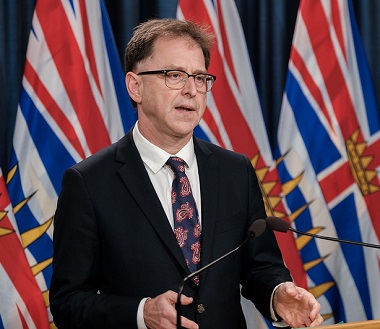
Health Minister Adrian Dix says his own church has experienced loss. Photo: BC government
Dix added with some emotion that he and Dr. Henry have listened carefully to faith leaders, then referred to his own church’s experience:
I can tell Reverend Dyck that in our church we have lost a lot of loved ones this year, including our minister. The loss of being able to come together on Sunday has been profound for members of that congregation, just as they have been for congregations around BC.
I am overwhelmingly inspired by the work done by faith communities, of all faiths, of all denominations, to support people in their community in a difficult time.
All I can say is, it’s not condescension, it’s gratitude that we feel for the support we get in our community wherever we find it, and for many people that’s in communities of faith. . . .
Concerns persist
Most pastors and other faith leaders are nowhere near as critical as pastor Dyck, but dissension, or at least serious concerns, continue to bubble. For example the ACMV (Association of Church Ministries Vancouver) will gather online today (December 17) to discuss these issues:
How to deal with government lockdowns. Constitutional rights. Medical realities and practical steps.
1) What are our constitutional rights as churches?
2) What are rights of businesses and individuals?
3) How did this all happen? Understanding Persuasion Techniques – and how to use them yourself.
4) Messages to share with congregations to help push back fear and educate about 2020 through a Biblical lens.
Three Change.org petitions to encourage the government to allow church to meet in person again (here, here and here) continue, though the rate of signatures has slowed.
And it appears that a few churches are continuing to meet in spite of health orders.
Looking forward
The planned dialogues with Dr. Robert Daum are a very positive step (though I was slightly disappointed that several emails for more information about them did not receive any response earlier this week). If the government has indeed been listening to faith groups, they will include a wide range of voices in those discussions.
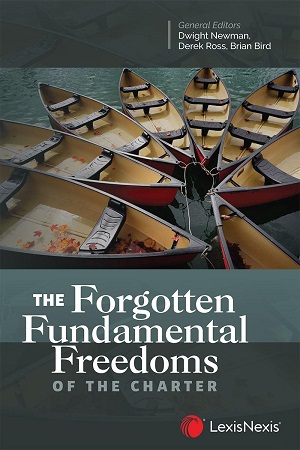 There are many factors issues to grapple with, but here a few that strike me as important, not only for discussions with Dr. Daum, but for other interactions over the next year:
There are many factors issues to grapple with, but here a few that strike me as important, not only for discussions with Dr. Daum, but for other interactions over the next year:
* The good will expressed by Horgan, Henry and Dix bodes well for the future. I can’t remember any period of time in which the church has had more attention in this province, so this is an ideal time to follow up on any opportunities for dialogue.
* What services are actually essential in our society? While provincial leaders appear sincere in their appreciation of faith groups, they may still not adequately apprehend their role. In other words, while they are not condescending or patronizing, they may have more to learn. See this article: ‘When believers become invisible.’
* Charter of Rights and Freedoms issues must be addressed. Religious freedom is specifically protected by the Charter. See my earlier article: “Restrictions on religious gatherings a reminder of ‘Forgotten Freedoms.'”
* Who are ‘faith leaders?’ That’s a very broad catch-all, one that covers a wide range of practices and which may not do justice to the role and identity of church leaders and the church itself. Rev. Ed Searcy wrote a good comment which touches on this issue: “The problem with calling the church a ‘faith community.'”
Many more such issues are important to discuss. Whether this pandemic lingers or simply in preparation for the next time, we need to learn from government oversights and churches’ lack of preparation. Some church leaders, or a coalition of faith groups, ought to pursue these dialogues diligently, making sure that all of us are better prepared next time around.

I am very appreciative of the openness of Dr. Henry, Minister Dix and other community leaders and their willingness to engage in further discussions and understand the importance and dynamics of faith communities and the responsibilities of faith leaders to ensure the spiritual, mental and emotional wellness of their congregations. And it may well be that in a legal test of constitutional rights, these abridged freedoms, no matter how temporary, may indeed be unconstitutional (I express no opinion on these legal issues).
Be that as it may, I believe that arguments and stands based on constitutional rights and individual freedoms are red herrings. In particular, the Christian faith community is called to a very high order of sacrificial love for one another – and that includes our family, friends, co-workers, neighbours and yes, strangers too.
For the sake of not transmitting the virus to others, we should willingly, even in the absence of mandatory edicts, make these temporary sacrifices. When we look to Jesus as our model, we see that He willingly sacrificed his own rights and died on the cross for humanity. Having to wear masks and observe social distancing, not celebrating Christmas or other events with people outside our household for a period of time is so trifling in comparison. Christians should rise to this higher calling to love one another by not risking transmission of the virus and encourage others to do likewise.
I do not make light of the huge financial cost to businesses, the loss of thousands of jobs, of the plight of those who can’t afford rent and are evicted or the lonely and elderly. These are issues that governments at all levels are trying to address and there are no easy answers. But simply doing our part by wearing masks and not gathering, even for a faith service or for Christmas, are daily acts of love that we can all show to our fellow human beings.
Wise words from Mr. Lee.
My reading indicates to me that Jesus ministered in a time when the Jewish people – indeed everyone in that cosmopolitan city – had their constitutional rights (such as existed, for of course, only Roman citizens had anything approaching rights that might be considered ‘constitutional’) violated at any time for any reason. And Jesus’ words specific to that situation were best contained in Mt 5:39-45 and his prescription in 5:46-48.
Despite one reading of a comment that gathering to record worship music is OK in some circumstances, it still isn’t. We’re all gonna do what we’re gonna do, but there may be consequences on earth for our actions, and for sure there will always be consequences in heaven. We just can’t imagine what they might be, because we are called on not to pass judgment.
At a time when previously-recorded music gives worship possibilities undreamt of through two millennia in the life of the church, can we all not find a way to do the church’s work of succouring the hungry, homeless and hopeless without gathering? What would our forbears say of our complaints? “First World problem?”
A couple of questions for everybody who agrees to the ban on faith communities gathering, possibly forever:
1. Since March, how many baptisms has your church performed?
2. Compared to the community outreach programs your church used to be involved in before March, is it the same, more or less?
3. Since March, how many people has your church been able to bring to Christ for the first time?
4. Since your church started streaming services, has viewership gone up, stayed the same or gone down?
We all know the answer to every one of those questions. And Dr. Henry and the Honourable Dix can keep telling us they care and listen, but if all they’re doing is sitting politely in attendance then ignoring every plea we make, this is all lip service. Not once have I read of an initiative either have taken after consulting with faith leaders, nor do I expect to ever hear them do so.
Instead, I will hear more quotes like Henry’s “I have repeatedly said that I have taken advice and have had the privilege of speaking to many faith leaders in the last few months and I appreciate their advice immensely.”
Catch that? Just flowery, political language to make us think she cares about Christians, Sikhs, Jews, anybody, when instead she uses the leverage given her under the Public Health Act to make a declaration with no data or evidence to support her directives.
Or Dix, who said, “So, we’re with you and we’re asking you to join us in helping in this period to help heal, heal ourselves physically, and protect ourselves and our good health, and also stay healed and stay better as a community.”
Again, more safe, political language which doesn’t acknowledge any concerns among those who believe in God, but instead a guarded instruction to us to follow what they’ve already decided. Because they either don’t believe fellowship and worship serves a purpose, especially any of the “healing” he talks about, or they want to drive God out of our lives. And they are.
Right now in BC, they are taking away our God, and they are now taking away our families. And those are the two areas most of us find hope.
Keep believing they’re doing this for the public good if you want. COVID survival rate is just under 100%. But the massive spike in cases of anxiety, stress, substance abuse, depression and stillborn births isn’t helping us when we would traditionally turn to those who share our faith, or the families we’ve often turned to.
“Yet I have left me 7,000 in Israel, all the knees which have not bowed unto Baal, and every mouth which hath not kissed him.” 1 Kings 19:18
I hope we all look to see where our knees are bent.